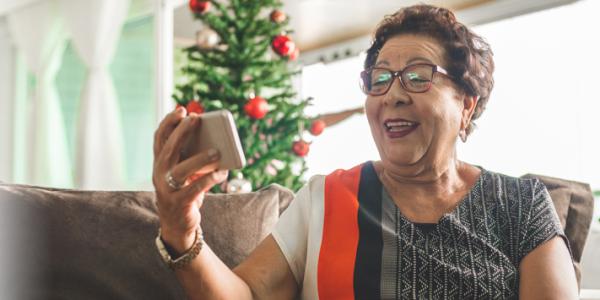
Loneliness is more common than you might think, and it can be especially devastating during the holidays. Learn more about the risks of loneliness, and the steps you can take to ensure that you or your loved ones don't feel quite so alone.
Feeling alone or lonely is something we all experience at some point in our lives, but in recent years it's become a much more serious concern. In fact, a recent study conducted by the Making Caring Common project at Harvard University found that 36% of U.S. adults of all ages reported feeling lonely frequently or most all of the time. While anyone can feel lonely – even when surrounded by others – for many seniors it can be just a fact of life. They may be widowed or childless, or their children may live too far away to visit very often. Their circle of friends may be dwindling, and they may have transportation or mobility challenges that make it hard to leave home.
All of these factors contribute to social isolation, which is one of the biggest threats to the physical, mental, and emotional health of seniors. Those who have recently lost a spouse or partner, are separated from friends and family, or are struggling to adjust to retirement are particularly vulnerable to loneliness and its health impacts. It's not fully understood why loneliness is harmful to our health, but one theory is that it may impact the cells in the immune system that promote inflammation. What is clear is the numerous health consequences of loneliness can include:
- Increased risk of heart disease and stroke
- Increased rate of premature death
- Up to a 50% increased risk of dementia
- Higher rates of depression and anxiety
- Increased risk of death for hospitalized patients
- Increased risk of obesity
- Weakened immune system
Fortunately, we know that engaging in meaningful social activities can make a huge difference in general health, attitude, and even cognitive functions – for people of all ages. For many people, it starts with family and friends. But, there are other ways to create a community and a support system that will minimize isolation and bolster health and well-being:
- Find a faith community. Regularly attending religious services has been shown to improve signs of depression and anxiety, and is a great way to expand your social circle.
- Take up a hobby you once enjoyed. As we age it's easy to let go of the things that brought us joy in our younger years. But now is a great time to take an art class, join a community hiking group, or sign up for a chess club. It's never too late to improve rusty skills and find fulfillment with others who enjoy the same activities. Volunteer. Giving of your time and engaging with others in volunteer activities is a sure-fire way to help diminish loneliness and isolation. During the holidays, there are more opportunities than ever.
- Join an online group of like-minded people. There's a lot you can do to connect and engage with others without leaving your home. A quick online search can lead you to groups with similar interests from politics and cooking to sports, reading, and film. Joining an online group can help you stay engaged and informed, meet new people, and even make lifelong friends.
- Send holiday cards. Take the time to write an actual short note to friends and loved ones you may not communicate with regularly. Just the act of writing and mailing a card can help ease feelings of loneliness. And, don't forget to read and treasure every card you receive for yourself!
The most important thing – during the holidays especially – is to take one single step to connect and engage with people. Just remember that some of them may be feeling lonely and alone as well, so you'll be helping others out as well as yourself.
This article first appeared in the December 2022 edition of the HealthPerks newsletter.

